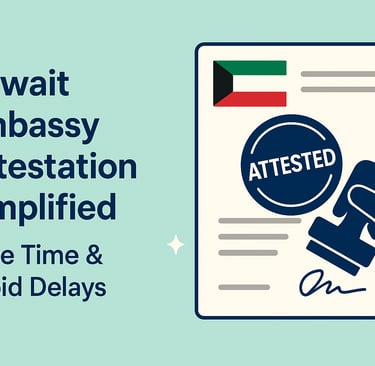Kuwait Embassy Attestation: A Simplified Process for Indian Expats
8/19/20254 min read


Understanding Embassy Attestation
Embassy attestation serves as a critical verification process for documents intended for use in foreign countries. For Indian expatriates residing in Kuwait, this procedure holds substantial importance as it ensures that personal and professional documents are legally recognized and deemed valid by the Kuwaiti authorities. The primary purpose of embassy attestation is to authenticate documents, which may include educational certificates, marriage certificates, and birth certificates, among others.
The process typically involves several steps, beginning with obtaining the necessary endorsements from relevant authorities in India, such as the state government and the Ministry of External Affairs (MEA). Once these endorsements are acquired, the documents must then be submitted to the Indian Embassy in Kuwait for final verification and attestation. This multi-layered approach ensures that the documents meet the legal criteria required for acceptance in Kuwait.
For Indian expatriates, failing to have essential documents attested can lead to significant complications. Without proper attestation, expatriates may encounter difficulties in various aspects of life, including securing employment, obtaining residence visas, or enrolling children in schools. Moreover, the lack of validated documents may hinder access to essential services, leading to bureaucratic challenges that can impede daily activities.
In Kuwait, where the legal framework necessitates that documents bear local recognition, embassy attestation helps prevent disputes and misunderstandings. Therefore, understanding the importance of this process is crucial for Indian expatriates. Ensuring that all relevant documents are accurately attested is not just a legal formality, but a necessary step towards a smoother integration into Kuwaiti society and adherence to local laws.
Step-by-Step Process of Attestation
The attestation process for Indian expats seeking to validate documents for use in Kuwait entails a few critical steps that must be followed meticulously to ensure a smooth experience. First and foremost, it is essential to prepare all necessary documents. These typically include educational certificates, birth certificates, marriage certificates, and any additional documentation required by the Kuwaiti authorities.
Once the essential documents are gathered, the next step involves verification with the relevant local authorities in India. This often includes obtaining an attestation from the Notary Public, followed by verification by the State Government. Each state may have specific procedures, so it is advisable to check with local authorities for any variations in the process.
After the documents have been authenticated by local authorities, Indian expats must then approach the Kuwaiti Embassy to proceed with the attestation. It is critical to have all previously verified documents ready for submission. Additionally, applicants should be prepared to provide copies of their passports and visa, as these may be required for the embassy's records. Be sure to verify the operational hours of the embassy and consider scheduling an appointment, if applicable, to avoid long waiting times.
It is important to note that there may be additional paperwork or fees required during this step. Each embassy or consulate may have differing fee structures based on the type of documents being attested, so it is advisable to inquire ahead. Additionally, bringing updated photographs may be necessary for specific documents. By carefully following these organized steps, Indian expats can efficiently navigate the attestation process and ensure their documents are fully prepared for use in Kuwait.
Common Challenges and How to Overcome Them
The attestation process for Indian expatriates in Kuwait is critical yet often fraught with challenges that can hinder progress. One of the most prevalent issues is document rejection. This can occur when documents are not in the correct format or lack required signatures. To mitigate this, expatriates should carefully review the necessary criteria and prepare their documents according to the Kuwait Embassy's guidelines before submitting them for attestation. It is advisable to double-check that all documents are complete and accurate, as even minor errors can lead to delays.
Delays in processing time is another significant obstacle faced by expatriates. Various factors contribute to this, including the volume of applications received by the embassy and bureaucratic inefficiencies. To address these delays, individuals can reach out to the embassy's contact points for updates on their applications. Additionally, allowing ample time for the attestation process and submitting requests well in advance of any deadlines can alleviate the stress associated with potential delays.
Language barriers often complicate communication with embassy staff, leading to misunderstandings about requirements or the status of documents. To navigate this challenge, expatriates might consider seeking assistance from bilingual friends or professional services specializing in document processing. This can facilitate clearer communication and reduce the likelihood of errors or misinterpretations during the attestation process.
Lastly, misunderstandings with embassy personnel may arise due to cultural differences or a lack of familiarity with the attestation processes. In such cases, maintaining a respectful and patient demeanor when engaging with embassy staff can go a long way. Understanding the cultural context and demonstrating gratitude for their assistance might improve interactions, making the process smoother.
Importance of Professional Assistance
Seeking professional assistance during the Kuwait embassy attestation process is crucial for Indian expatriates aiming to navigate the complexities involved. The attestation of documents can be a daunting task, especially considering the numerous regulations and requirements set by both the Indian government and the Kuwaiti authorities. Professional consultancy services offer a wealth of knowledge and expertise, both of which can simplify the steps involved. By opting for experienced service providers, expats can bypass common pitfalls that may delay or jeopardize their applications.
One significant advantage of engaging professionals is the prevention of errors in documentation. In many cases, a simple oversight can result in lengthy delays, necessitating additional steps to rectify the mistake. With the guidance of a qualified consultant, expatriates are less likely to encounter such issues, as these experts understand the nuances of the attestation requirements. This attention to detail ensures that all documents are thoroughly verified and correctly submitted, expediting the overall process for the individual.
Additionally, time is often of the essence for busy expatriates who might have work and family commitments. Consulting professionals can free up valuable time by managing the entire attestation process on behalf of their clients. This convenience allows expats to remain focused on their responsibilities while ensuring that their documentation needs are being addressed efficiently and effectively.
Choosing the right service provider is essential for a successful attestation experience. It is critical to discern credible assistance by referring to reviews, testimonials, and accreditations of the consultancy firms. While considering costs, it is vital to weigh the financial investment against the convenience and assurance that professional services provide. Ultimately, this decision can have a lasting impact on an expatriate's experience, making the selection of a reliable consultant a key component in the attestation process.
